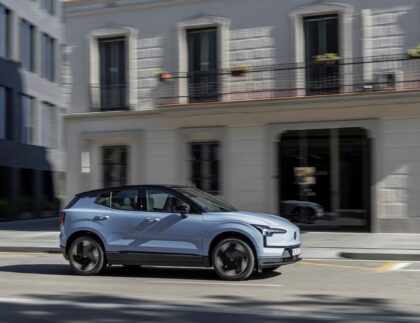
SwedCham HK’s Sustainability Platform consists of 15-20 companies, all committed to adopt sustainable business practices in Hong Kong and beyond. We have given the committee members a chance to further explain their ambitions and thoughts on the subject. Their views are presented as a series of sustainability stories on our website every Thursday. This weeks story comes from Alexander Mastrovito, Head of Sustainable Transport Solutions at Scania Asia and Oceania. Scania is one of Sweden’s major manufacturer of commercial vehicles, specifically within the sector of heavy buses and trucks.
How would you describe the way you work with sustainability at Scania today?
– With customer profitability as the starting point, Scania wants to be the leading provider of sustainable transport. This means integrating sustainability fully into the business and working with others to tackle impacts, transform our industry and create lasting value. Integrating sustainability into the business means Scania has to leverage innovative thinking, develop partnerships and work more extensively within the logistics flow to capture efficiencies.
Our sustainable transport solutions rest on three pillars: energy efficiency, alternative fuels and electrification, and smart and safe transport. By combining the three approaches, Scania’s objective is to pioneer and scale sustainable transport solutions that deliver value for all stakeholders.
Tell us about your own journey within sustainability!
– As one of Sweden’s major manufactures of commercial vehicles Scania AB was formed in 1911 through the merger of Södertälje-based Vabis and Malmö-based Maskinfabriks-Aktiebolaget Scania. Driving customer profitability through sustainable solutions and pursuing responsible business have been long-term objectives of the company, in order to guarantee profitability and ensure sustainable development. Scania has increasingly aimed to minimize the environmental and social impact of our products and to increasingly promote circularity in our processes.
During Scania’s journey, the company has realized that there is no single solution for transforming the transport system into a sustainable one. Rather, a holistic approach is called for, considering the specific transport assignment and the maturity of the transport and logistics infrastructure in different parts of the world. Scania in Hong Kong has been one of the pioneers in realizing the vision of integrating sustainability into all aspects of our operations with Asia’s first heavy Hybrid electric truck.
What made you join SwedCham’s Sustainability Committee?
– Any significant sustainability transition cannot be achieved by one single actor on its own. It requires new forms of partnerships – where we can help and complement each other. The Swedish Chamber is a very attractive platform for partnering up with like-minded people who are keen on driving this transition towards better sustainability across a multitude of sectors. Simply put, we are stronger together, and this is the only way to drive the change that we need.
How would you like to help make Hong Kong and the world more sustainable?
– Scania cannot solve tomorrow’s challenges with yesterday’s thinking. Being at the forefront of innovation is essential to deliver sustainable transport solutions. Going forward Scania will work with further improving the overall emission levels from transportation and to provide smarter and more technologically advanced solutions for both Hong Kong’s specific mobility needs and for the world as a whole.
In the future, Scania expects many new types of collaborations between industries. By working within with transport companies and their customers, Scania has identified shared objectives. This includes retailers’ need to reduce CO2 emissions from logistics, the transporter’s imperative to reduce fuel costs, and for Scania, to tailor solutions for different industries as value-added services. By working together, we can identify opportunities and solutions to both local and global challenges.
In conclusion, Scania’s aim is to drive the shift towards a sustainable transport system, creating a world of mobility that is better for business, society and the environment.










